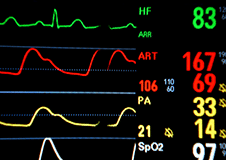New compound could protect from post-heart attack tissue damage

(Medical Xpress)—A chemical compound designed and created at the University of Otago may hold great promise for reducing tissue damage following heart attack, stroke or major surgery, according to research published today in the prestigious international journal Nature Medicine.
The compound, named MitoSNO, was developed by a team led by former Otago University biochemist Dr Mike Murphy in collaboration with Professor Rob Smith of Otago's Department of Chemistry. Together the pair specialise in creating new molecules that can enter cells and act specifically in mitochondria, which are their 'powerhouses'.
The new study was led by Dr Murphy, who is now based in the UK Medical Research Council's Mitochondrial Biology Unit, and University of Cambridge colleagues. The authors, who include Professor Smith, have published findings that MitoSNO helps protect heart muscle from reperfusion injury when tested in mice.
Reperfusion injury occurs when blood supply is suddenly restored to tissue that has undergone prolonged oxygen starvation. The returning blood triggers the over- production of devastating free radical molecules inside mitochondria, which kills the cells.
While the initial prolonged oxygen starvation in a heart attack itself damages tissue, most of the cell death occurs through reperfusion injury after medical intervention has unblocked major blood vessels supplying the heart.
Professor Smith says that MitoSNO works by briefly 'switching off' the mitochondria in the first few minutes after blood flow is returned, preventing the deadly build-up of free-radicals. To achieve this, the compound is designed to accumulate inside heart mitochondria rapidly after its injection into the blood and temporarily modify some of the key proteins required for mitochondrial function.
In the study, the researchers tested MitoSNO in a mouse model of heart attack. MitoSNO was given to the mice by injection just before blood flow to the heart was restored. The area of damaged heart tissue was significantly reduced in the mice that had received MitoSNO compared with the control animals, showing that MitoSNO prevents cell death during the reperfusion stage.
The authors say the fact that MitoSNO works when given as blood is restored to the oxygen-deprived heart is a unique strength, because it could be given to heart attack patients when they get to hospital and blood flow to the heart is restored by reopening the blocked artery. At the moment there are no established treatments that can be given at this crucial time.
Dr Murphy says that the researchers think a similar process happens in other situations where tissue is starved of oxygen for a prolonged period, for example after a stroke or during surgery where major arteries are clamped to prevent blood loss.
"We are hopeful that if human trials of MitoSNO are successful it could eventually be used in many other areas of medicine."
Professor Smith says that the development of the compound is a great example of international multidisciplinary research at its best.
"New Zealand chemists had the know-how to create the molecule, Mike could determine its basic biological action, and our colleagues at Cambridge and other universities brought the necessary expertise to study its effect in reperfusion models and its potential for clinical use in heart patients,'' he says.
More information: 'Cardioprotection by S-nitrosation of a cysteine switch on mitochondrial complex I' by Chouchani et al, Nature Medicine. doi:10.1038/nm.3212
















